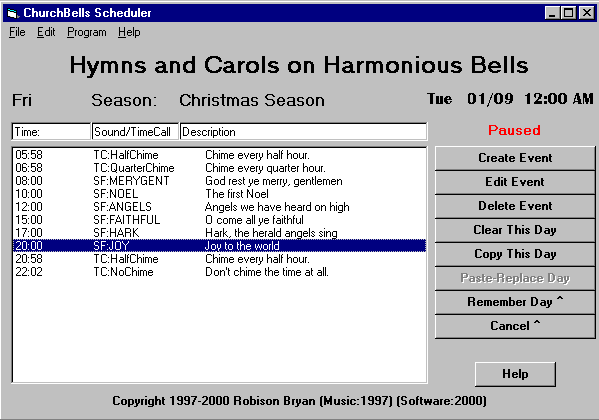
In each season, you can program seven weekdays. Here's one.

Help For "Schedule Selected WeekDay":
CAUTION: The only way to get a day remembered is to tell the day to be remembered by the week, and tell the week to get remembered by the system.
From this screen you'll get to choose for each event what time it will occur, and what the event will actually be. You can also choose to either remember this day or cancel. If you choose cancel, then the scheduling changes you've made will not be remembered.
It is the week that remembers the day, and then the system remembers
the week. Thus the caution statement at the beginning.
This screen shows a list of all the events that will happen on the
weekday in question. If you select Monday, and scedule some events, then
those scheduled events will happen every Monday until the end of the season.
If you wanted one Monday to be different from the next Monday, then you'd
have to put those two Mondays in different seasons from each other.
An event can be one of two kinds: A SoundFile or a TimeCallChange. If the event is a "SoundFile" then at the specified time the SoundFile (song) will play. If the event is a "TimeCallChange" then the bell tower will at that time Change the way in which it Calls out the Time.
There are four different TimeCallChange events that you could schedule. They are: NoChime, HourChime, HalfChime and QuarterChime. They are named after the four ways you could want the bell tower to respond to time. When you fire off one of these events you're telling the bell tower to abandon the old way, and to start responding in the new way that you've chosen (until it gets changed again by another TimeCallChange event).
There are four ways that bell tower clocks traditionally respond to the time:
"QuarterChime": Every fifteen minutes, the bell tower plays a melody fragment. At quarter past the hour, it plays one group of four notes. At half past the hour, it plays two groups of four notes. At quarter till the hour, it plays three groups of four notes. On the hour, it plays the whole melody consisting of four groups of four notes. (You've likely heard the "on the hour" melody from fancy doorbells.) Then it counts out the time by striking a larger bell as many times as whatever time it is. A common name for this is the "Westmeinster chime set". (Of course you are still free to schedule songs events at any time you wish, and those will play.)
"HalfChime": Every half hour, the bell tower plays a melody fragment. At half past the hour, it plays two groups of four notes. On the hour, it plays the whole melody consisting of four groups of four notes. Then it counts out the time by striking a larger bell as many times as whatever time it is. (Of course you are still free to schedule songs events at any time you wish, and those will play.)
"HourChime": On the hour, it plays a melody consisting of four groups of four notes. Then it counts out the time by striking a larger bell as many times as whatever time it is. (Of course you are still free to schedule songs events at any time you wish, and those will play.)
"NoChime": Whenever the TimeCall is set to "NoChime", then it will not play any portion of the Westmeinster chime set, nor will it count out the time on the big bell. (Of course you are still free to schedule songs events at any time you wish, and those will play.)
You can use these TimeCallChange events to scale down the bells activity
toward the end of the day, and to completely turn off the chiming activity
during the hours in which neighbors might want to sleep, (as well as during
Sunday service and choir practice). You could also use the bells to notify
parishoners of key times such as the start of Sunday school, Worship Service
or coffee break / fellowship.